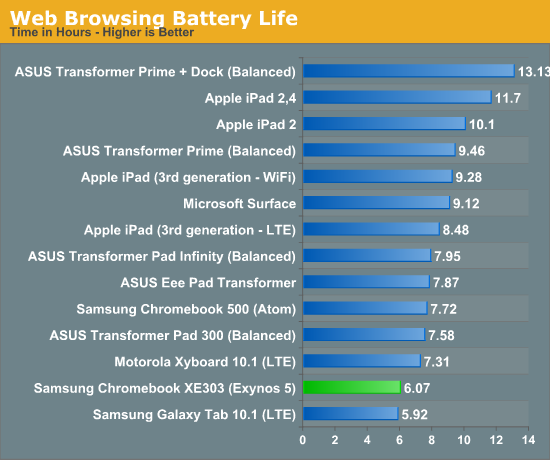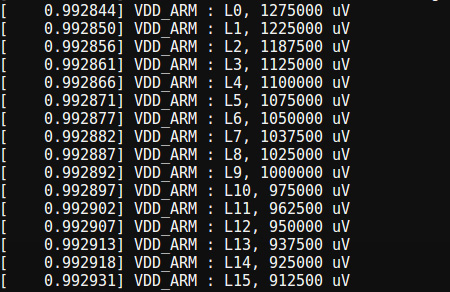Samsung Chromebook (XE303) Review: Testing ARM's Cortex A15
by Anand Lal Shimpi on October 31, 2012 9:00 AM ESTBattery Life & Power Analysis
The final unknown in all of this is power consumption. ARM's Cortex A15 isn't really supposed to be a sipper of power, and when placed in a notebook I don't know that there's a lot we can conclude about how it stacks up to Atom either. Some high level power consumption data would normally help but these two platforms are fairly different:
| Samsung Chromebook Power Consumption Comparison | ||||||
| Display @ 200 nits | Idle | Kraken (Avg) | Kraken (Peak) | |||
| Samsung Chromebook 500 (Atom N570) | 11.53W | 14.4W | 15.2W | |||
| Samsung Chromebook 303 (Exynos 5 Dual) | 6.33W | 10.5W | 11.3W | |||
The new Chromebook consumes considerably less power at idle than its predecessor. The smaller display, simplified motherboard and truly integrated SoC platform are likely all to thank for this. The significant reduction in power also helps explain the big reduction in battery capacity as well.
Under load, the two platforms do see differing levels of additional power consumption. The new Exynos 5 based Chromebook sees a dramatic increase in power consumption under load, hitting 10.5W (a 66% increase over idle) while running Mozilla's Kraken benchmark. The Atom N570 based Chromebook increases power consumption as well, but just not by as significant a degree: ~25%. This actually helps illustrate exactly why Atom wasn't phone worthy in its earlier incarnations. Contrary to popular belief, it wasn't actually peak power consumption that was the problem (a move to 32nm can easily eat into these numbers). The total platform power consumption, particularly at idle, was Atom's real problem in the early days. It also turns out that this is much of what keeps Intel's Core processors from moving into ultra mobile form factors, something that Haswell is supposed to address.
Given that we're dealing with somewhat different panels here, I wanted to see what power consumption looked like if we removed the panels from the equations. I re-ran all of the power data with the display turned off:
| Samsung Chromebook Power Consumption Comparison | ||||||
| Display Off | Idle | Kraken (Avg) | Kraken (Peak) | |||
| Samsung Chromebook 500 (Atom N570) | 8.82W | 11.4W | 12.4W | |||
| Samsung Chromebook 303 (Exynos 5 Dual) | 4.07W | 8.32W | 9.27W | |||
The old Atom based Chromebook uses more than twice the idle power of the new version - it's no wonder Google was able to get away with a battery half the size. Once again however we see a much larger increase in power consumption once the Cortex A15 is under heavy load. Active power consumption more than doubles on the new Chromebook, while we see around a 30% increase on the Atom based system. I do wonder what will have to be done to get the Exynos 5 Dual into a smartphone as an increase of ~4W under load just won't cut it in a phone. The Atom platform shows a 2.6W increase in power under load, which sounds about right for a high clocked 45nm part.

Despite the more power efficient platform, the reduction in battery capacity puts the new Chromebook well below the Atom model in battery life. Our wireless web browsing test put the new Chromebook at just over 6 hours of continuous use on a single charge. For a notebook that's not too bad, but compared to modern tablets it's not good.

The performance gains over Atom (and by extension, the ARM Cortex A9) do give us some indication as to what could be done to get Exynos 5 into a smartphone. By dropping clocks much lower than 1.7GHz Samsung would be able to maintain a performance advantage in a very power constrained device and hopefully keep power in check. The photo above features a list of all of the voltage levels supported by Samsung's Exynos 5 Dual as implemented in the new Chromebook.










149 Comments
View All Comments
TrackSmart - Wednesday, October 31, 2012 - link
I think netbooks are the more obvious comparison. You can buy Intel/AMD powered netbooks running Windows/Linux for $200 and up. The "better" choice depends on just how basic your computing needs are and how much you can live with a cloud-based operating system.Krysto - Thursday, November 1, 2012 - link
Browsing on them will be much slower, especially on those single core ones that cost $200. I know because I've used one. Single core Atom browsing on a netbook is excruciatingly painful. Plus, I believe I saw in a Cnet review that this Chromebook has higher performance in browsing than IE9 with a Core 2 Quad. That's not a very fair comparison because it used IE9, but still.TrackSmart - Thursday, November 1, 2012 - link
I wasn't advocating one or the other, just pointing out the obvious comparison is not between used laptops and chromebooks, but between chromebooks and other "netbook-like" laptops.It's a tradeoff between running a lightweight, but very limited operating system (Chrome) or a heavier but full-featured and mature operating system (Windows or Linux). Performance versus greater availability of features and software.
I've also used single core atom netbooks and found them painfully slow. I haven't used the newer dual core Atom or dual core AMD-based netbooks that are more common these days. I'm guessing they are similarly painful, given that single-threaded performance is the major limitation for light workloads.
Jumangi - Wednesday, October 31, 2012 - link
Chromebook...a "solutiion" still in search for a problem/market to serve.Peroxyde - Wednesday, October 31, 2012 - link
Can you please clarify how the Chromebook perform the following tasks in offline mode?1. Can I work and save documents when not connected to the Internet?
2. Is it possible to play music or video files stored on the SD Cards? What media formats are supported? (MP3, MP4, MKV?)
3. Can the Chromebook access media files over the LAN, via DLNA client or SAMBA shares?
Thanks in advance for any help.
FormulaRedline - Wednesday, October 31, 2012 - link
I'm also interested in this. The review doesn't seem to go at all into the required internet connection and how this affects functionality. Unfortunately, we don't yet live in a world with free WiFi everywhere.Selden - Wednesday, October 31, 2012 - link
Offline YESA/V YES (but not all formats)
Samba NO
ddy - Saturday, November 17, 2012 - link
I want to ask if there is smb, already using the Samsung ARM Chromebook. I have a performance issue on working with Google docs. As you asked about the documents, I wanted to be involved.It is not that sensitive to respond, neither on-line nor offline. Does any of you have a similar problem??
Thanks in advance.
StormyParis - Wednesday, October 31, 2012 - link
Nice review, thanks.I'd have liked more info about offline use though. Even if I'm online most of the time, it's very important that i can also be productive, and entertained, while offline.
prophet001 - Wednesday, October 31, 2012 - link
The ultimate digital pick-pocket.